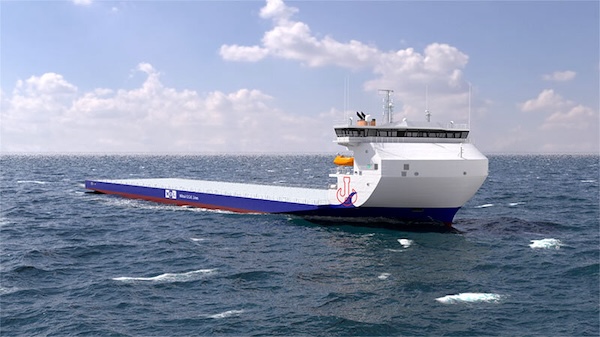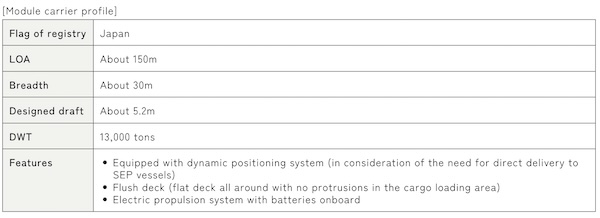Japan’s 1st Coastal Module Carrier to Transport Offshore Wind Turbine Foundation Components- MOL Drybulk Makes Marine Transport Deal with JFE Engineering; MOL Signs Contract for Vessel Construction

Mitsui O.S.K. Lines, Ltd. announced that its group company MOL Drybulk Ltd. (MOL Drybulk; President & CEO: Koichi Hirata; Headquarters: Minato-ku, Tokyo) has signed a basic contract for marine transport with JFE Engineering Corporation (President & CEO: Kazuyoshi Fukuda; Head Office: Chiyoda-ku, Tokyo (Note 1). In addition, MOL and Taizhou Sanfu Ship Engineering Co., Ltd. (Sanfu; President: Yang Yifeng; Head Office: Taizhou, China (Note 2)) have concluded a contract for the construction of a new module carrier (Note 3) to be launched under the contract. This will be the first coastal module carrier in Japan to transport components for offshore wind turbine foundation components.

CG rendering of the first coastal module carrier
The vessel is scheduled for delivery in the spring of 2026, and will then engage in the coastal transport of offshore wind turbine foundations from JFE Engineering’s manufacturing base in Kasaoka-shi, Okayama Prefecture to offshore wind turbine construction sites in Japan. In April, JFE Engineering began production of monopiles used to build the foundation for offshore wind power generation. MOL Coastal Shipping, Ltd. (President: Hiroshi Kobayashi; Head Office: Minato-ku, Tokyo) will operate the vessel under the management of MOL Drybulk.

(Koichi Hirata, President & CEO, MOL Drybulk and Atsuo Shikata, Excective Vice President, JFE Engineering Corporation)
The new ship will feature the latest design already proven effective in the European market. It will be equipped with a dynamic positioning system (DPS) and offer higher weather resistance than non-self-propelled barges, providing direct delivery of cargo to self-elevating platform (SEP) vessels at offshore wind power construction sites.
The module carrier has a flat deck so that it can directly load wind turbine components, such as monopiles, towers, blades, nacelles, and floating foundations, from the stern and sides of the vessel using multi-axle trucks and so on. As Japan’s offshore wind power generation progresses, demand for wind turbine components in domestic transport is expected to increase in a variety of scenarios. MOL Drybulk currently operates a 3,700-ton class module carrier on a time charter basis to transport onshore and offshore wind turbine components, plant cargo, marine equipment, and so on in waters off the coast of Asia. By leveraging its expertise in operating this module carrier, it will continue to meet customers’ marine transport needs.

The MOL Group will contribute to the realization of a net-zero emissions society in line with the MOL Group Environmental Vision 2.2, by leveraging its accumulated experience and expertise in offshore wind power generation-related businesses.
Source: Mitsui O.S.K. Lines

 Hellenic Shipping News Worldwide Hellenic Shipping News Worldwide, Online Daily Newspaper on Hellenic and International Shipping
Hellenic Shipping News Worldwide Hellenic Shipping News Worldwide, Online Daily Newspaper on Hellenic and International Shipping























 PG-Software
PG-Software